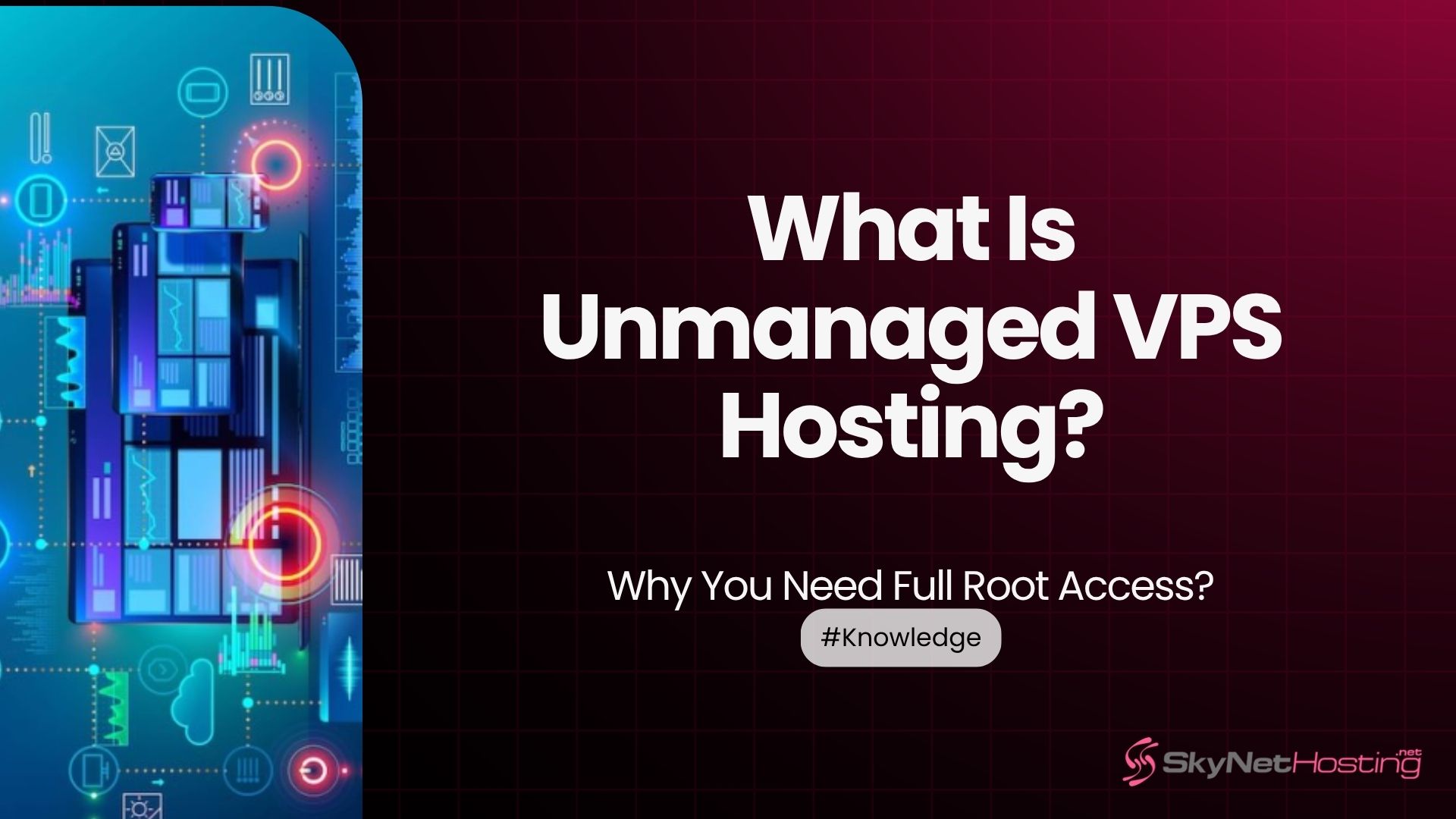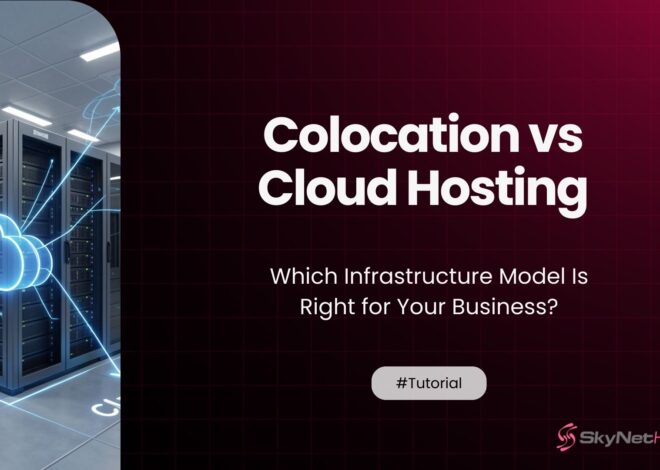
What Is Unmanaged VPS Hosting and Why You Need Full Root Access
TL;DR
- Unmanaged VPS hosting provides full root access, allowing users to customize everything from the OS to software configurations, without provider-imposed restrictions.
- It is more cost-effective than managed hosting, but all server maintenance, security, updates, and troubleshooting are the user’s responsibility.
- Unmanaged VPS is ideal for developers, sysadmins, and businesses with technical expertise who need flexibility for custom environments or specialized applications.
- Managing an unmanaged VPS requires strong command-line skills, knowledge of security updates, backup planning, and server management practices.
- Choosing a reliable provider matters: look for modern hardware (like NVMe SSDs), robust network connectivity, scalability options, and strong uptime guarantees.
- Skynethosting.net is recommended for its high-performance hardware, flexible OS choices, scalable plans, and transparent pricing for unmanaged VPS.
Are you tired of hosting restrictions holding back your projects? Unmanaged VPS hosting might be your answer.
This type of hosting gives you complete server control. You get full root access to customize everything. No hand-holding from your hosting provider. No preset configurations limiting your choices.
But here’s the catch. You handle all the technical stuff yourself. Server maintenance, security updates, and troubleshooting become your responsibility.
Is unmanaged VPS hosting right for you? This guide breaks down everything you need to know. We’ll cover who benefits most from this hosting type. You’ll learn about the key features and potential drawbacks. Plus, we’ll help you choose the right provider for your needs.
What Exactly Is Unmanaged VPS Hosting?
Unmanaged VPS hosting gives you a virtual private server without technical support. Your hosting provider supplies the hardware and network connection. Everything else is up to you.
Think of it like renting an empty apartment versus a hotel room. The hotel room comes with daily cleaning and room service. The apartment gives you more space and freedom. But you handle the maintenance yourself.
With unmanaged VPS, you get root access to your virtual server. You can install any operating system you want. You choose your own software stack. No restrictions on what applications you can run.
The main difference from managed VPS? Your hosting provider won’t help with server administration. They keep the physical hardware running. But software issues, security patches, and performance optimization are your job.
Who Should Consider Unmanaged VPS Hosting?
Unmanaged VPS hosting works best for technical users. Here’s who gets the most value:
- Experienced developers love the flexibility. You can set up custom development environments. Install specific versions of programming languages. Configure servers exactly how your projects need them.
- System administrators appreciate the control. You can implement your own security protocols. Set up monitoring systems that fit your workflow. Optimize performance based on your specific requirements.
- Businesses with in-house server expertise save money this way. Instead of paying for managed services, your team handles server administration. This works well if you already have skilled technical staff.
- Advanced users running specialized applications need this level of access. Gaming servers, custom web applications, and high-performance computing often require root-level configuration.
Key Features That Set Unmanaged VPS Apart
Full Root Access Changes Everything
Root access means complete administrative control. You can modify system files. Install any software package. Change network settings. No permissions to request from your hosting provider.
This level of access lets you optimize performance for your specific use case. Need to adjust kernel parameters? You can do that. Want to compile custom software? No problem.
Choose Your Operating System
Most unmanaged VPS providers offer multiple OS options. Popular choices include various Linux distributions like Ubuntu, CentOS, and Debian. Some providers also support Windows Server installations.
You’re not stuck with your hosting provider’s preferred setup. Pick the OS that works best for your applications and skill set.
No Control Panel By Default
Managed hosting usually includes cPanel or similar control panels. Unmanaged VPS typically starts with a clean OS installation. You access your server through SSH or remote desktop.
This might seem inconvenient at first. But it gives you complete freedom to install your preferred management tools. Or skip the control panel entirely for maximum performance.
Complete Configuration Flexibility
Every aspect of your server is customizable. Web server software, database systems, programming language versions. You decide what gets installed and how it’s configured.
This flexibility is crucial for complex applications. Some software stacks require specific configurations that managed hosting can’t accommodate.
Why Choose Unmanaged VPS Hosting?
Lower Costs Mean Better Value
Unmanaged VPS plans cost significantly less than managed alternatives. You’re not paying for technical support staff. No premium for pre-configured setups or maintenance services.
This cost savings adds up quickly. Especially if you’re running multiple servers or need high-resource configurations.
Complete Control Over Your Environment
You make all the decisions about your server environment. Install only the software you need. Configure services for optimal performance. Remove unnecessary components that waste resources.
This control level is impossible with shared hosting or managed VPS. Even dedicated servers sometimes come with restrictions from hosting providers.
Deploy Custom Software Stacks
Need a specific version of Python? Want to use an uncommon database system? Unmanaged VPS lets you install whatever your project requires.
This flexibility is essential for developers working with cutting-edge technologies. Or businesses running proprietary software that needs specific server configurations.
No Artificial Limitations
Managed hosting often includes usage restrictions. Limits on CPU usage, memory consumption, or concurrent connections. These restrictions help providers manage server resources across multiple customers.
With unmanaged VPS, you use the full capacity you pay for. No artificial throttling or usage policies to work around.

The Challenges of Going Unmanaged
Technical Support Is Limited
Your hosting provider won’t help with software problems. Server crashes, application errors, and performance issues become your responsibility to diagnose and fix.
This can be stressful if you’re not comfortable with server administration. A misconfiguration could take your server offline until you figure out the problem.
You Need Server Administration Skills
Managing an unmanaged VPS requires real technical knowledge. You should be comfortable with:
- Command line interfaces (SSH for Linux, PowerShell for Windows)
- Installing and configuring software packages
- Troubleshooting network and application issues
- Understanding basic security principles
Without these skills, you might struggle to keep your server running smoothly.
Security Becomes Your Job
Hosting providers handle physical security and network protection. But securing your server software is up to you.
This includes installing security updates, configuring firewalls, and monitoring for threats. A poorly secured server can be compromised quickly.
Backup and Recovery Planning
Most managed hosting includes automatic backups. With unmanaged VPS, you need to set up your own backup system.
This means choosing backup software, scheduling regular backups, and testing recovery procedures. It’s easy to forget until you need it.
Unmanaged vs Managed VPS: The Key Differences

Cost Comparison
Unmanaged VPS typically costs 30-50% less than managed alternatives. A managed VPS that costs $50/month might only cost $25/month unmanaged.
But consider the hidden costs. You might need to spend time on server maintenance. Or hire additional technical staff to handle server administration.
Control Level
Managed VPS gives you some control but within limits. You can install applications and modify configurations. But core system settings might be restricted.
Unmanaged VPS gives you complete control. Change anything you want. Install any software. Modify system files freely.
Support Expectations
Managed VPS includes technical support for server-related issues. Software problems, performance optimization, and security concerns get professional help.
Unmanaged VPS support is limited to hardware and network connectivity. Everything else is your responsibility to handle.
When Does Unmanaged VPS Make Sense?
Gaming Server Hosting
Game servers often need specific configurations. Custom mods, specialized networking settings, and performance optimizations. Managed hosting rarely supports these requirements.
Popular games like Minecraft, Counter-Strike, or ARK require root access for proper server administration. You need to install game server software, configure player limits, and manage save files.
Custom Web Application Development
Complex web applications might need unusual software combinations. Specific database versions, custom-compiled modules, or proprietary software components.
Managed hosting typically offers standard LAMP or MEAN stacks. If your application needs something different, unmanaged VPS gives you the flexibility to build exactly what you need.
High-Performance Development Environments
Developers working on resource-intensive projects need powerful, customizable environments. Machine learning development, big data processing, or video rendering applications.
These use cases benefit from fine-tuned performance optimizations. Custom kernel parameters, specialized drivers, or optimized memory management.
How to Choose the Right Unmanaged VPS Provider
Hardware Specifications Matter
Look for providers using modern hardware. SSD or NVMe storage performs much better than traditional hard drives. Adequate RAM and CPU power for your applications.
Check the underlying server specifications. Some providers oversell their servers, leading to poor performance during peak usage times.
Network Quality and Uptime
Reliable network connectivity is crucial. Look for providers offering uptime guarantees of 99.9% or better. Multiple network connections help prevent outages.
Consider the provider’s data center locations. Choose servers close to your users for better performance.
Operating System Support
Make sure your preferred OS is available. Most providers support popular Linux distributions. Windows Server support might cost extra.
Some providers offer custom OS installations. This can be helpful if you need a specific configuration or uncommon distribution.
Scalability Options
Your resource needs might change over time. Look for providers that make it easy to upgrade RAM, CPU, or storage. Some offer seamless scaling without server reboots.
Avoid providers that require manual server migration for upgrades. This process can be time-consuming and risky.
Common Mistakes to Avoid
Don’t choose providers based on price alone. Extremely cheap hosting often means oversold servers or unreliable hardware.
Avoid providers with poor customer reviews about network reliability. Even unmanaged VPS needs stable connectivity.
Don’t underestimate your bandwidth needs. Some providers charge high overage fees for exceeding included bandwidth limits.
Why Skynethosting.net Stands Out for Unmanaged VPS
Skynethosting.net offers powerful hardware configurations for unmanaged VPS hosting. Their servers use NVMe storage that’s significantly faster than traditional SSDs.
Their pricing structure is transparent and affordable. No hidden fees or surprise charges for essential features. Multiple data center locations help you choose the best performance for your users.
The wide selection of operating systems includes popular Linux distributions and Windows Server options. Easy scaling lets you adjust resources as your needs change.
With over 20 years in the hosting business, they understand what technical users need from unmanaged VPS hosting. Their infrastructure is designed for reliability and performance.
Take Control of Your Hosting Environment
Unmanaged VPS hosting gives you the freedom to build exactly what you need. Complete root access, custom configurations, and lower costs make it attractive for technical users.
But this freedom comes with responsibility. You handle server maintenance, security, and troubleshooting. Make sure you have the skills and time to manage these tasks effectively.
The right unmanaged VPS provider makes a huge difference. Look for reliable hardware, good network connectivity, and transparent pricing.
Ready to explore unmanaged VPS hosting? Check out the powerful and affordable options at Skynethosting.net. Their technical infrastructure and competitive pricing make them an excellent choice for your next project.
FAQs
What is unmanaged VPS hosting?
Who should choose unmanaged VPS hosting?
What are the main benefits of unmanaged VPS?
Key benefits include full control with root access, lower costs compared to managed hosting, complete configuration flexibility, deployment of custom software stacks, and no artificial limitations on resources or usage imposed by the hosting provider.
What skills are required for unmanaged VPS hosting?
What are the main drawbacks or risks?
Major drawbacks include limited support from hosting providers, as they generally only handle hardware and connectivity issues. You must handle all software problems, security upkeep, system backups, and troubleshooting without external help.



